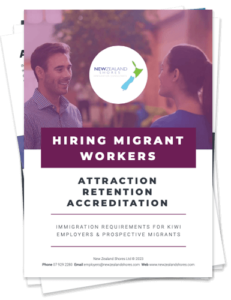Migrant workers have the same employment rights as New Zealanders
Understanding your obligations as an employer wanting to recruit migrants may seem daunting at first glance. However, it is not very different to hiring Kiwis. This page details requirements around terms of employment. The section further down details requirements for accredited employers specifically, what is allowed, not allowed, meeting your accredited employers obligations, and circumstances where you need to notify Immigration New Zealand.
Offering a role
The onus is on employers to check if a person has the legal right to work in New Zealand (as per the Immigration Act 2009). However, a common misconception is that a person must have a valid work visa to be offered a job. This is incorrect. A migrant can be offered and can accept a role before they have a work or resident visa. They must however have the visa approved by the time they start work.
You must ask for a document showing they have valid work rights, such as en eVisa, an Australian passport, or other approved travel documents.
In some cases, your candidate may already be allowed to work in New Zealand. Many temporary visa holders have work rights on their current visas.
Penalties and fines for hiring or continuing to hire a person who cannot legally work for you can reach NZD$50,000.
Terms and conditions of migrants' employment
You must offer to a migrant candidate the same terms of employment as you would a New Zealand citizen or resident. In essence, you must offer the same hourly rate and workplace standards.
A foreign national being offered employment in New Zealand must be offered the legal minimums in terms of:
-
- written employment agreement
- pay rates
- Break and holiday entitlements
- Sick, parental and bereavement leave
- Health & safety
- Accurate pay and holiday records
Penalties for exploiting a migrant worker will at minimum trigger sanctions. You will be put on a list of non-compliant employers and will not be able to hire migrants again for a period of time. Maximum penalties for severe breach can reach NZD$100,000 and a term of seven years imprisonment.
Read more about breaches of minimum employment standards
Do not forget: migrant workers in New Zealand have the same rights as New Zealand citizens.
Help your migrant staff settle in New Zealand
Beyond the visa application, an employer should support their migrant staff in their initial settlement
You have put time and effort in finding the right talent for your business ; It is in your company's best interest to ensure your new staff's arrival and settlement into your work place lives up to their expectations. There are a few simple steps you should be mindful of, before arrival, on arrival, on their first day, and thereafter.
 Prepare beforehand
Prepare beforehand
Many migrants have thought through their migration for some time and are well aware of what to expect on arrival. Regardless, it is a huge undertaking for most families to start over in a new country. As an employer, you should be prepared to provide at least basic guidance for these new arrivals. This may be in the form of an orientation programme, or pairing the new staff with a more senior member of their team.
Life in New Zealand
Beyond the workplace, migrants will need some information about the region, accommodation, banking, transport, schooling, or tax. Some larger companies can afford a relocation package which helps contributing towards visa fees, or accommodation. But it's not just about money. Many migrants have relatives who can assist, but those who do not will welcome assistance from their co-workers in any shape or form.
Training and etiquette
On paper, a candidate may come across as meeting your requirements. Once on site they will also likely meet or exceed your expectations. However, beyond their professional or technical skillset, there may be differences in social etiquette, communication standards, or expectations on both ends. It is important you keep communication open to avoid disappointment for either party involved.
Immigration Advice
Immigration Advice is a regulated industry in New Zealand
Only people who are licensed can provide advice on New Zealand immigration matters, unless they are exempt under the Immigration Advisers Licensing Act 2007. People who are exempt include New Zealand lawyers and Citizens Advice Bureau staff. (source Immigration website).
Immigration advice is defined in the Immigration Advisers Licensing Act 2007 as:
“Using or purporting to use, knowledge of or experience in immigration to advise, direct, assist, or represent another person in regard to an immigration matter relating to New Zealand, whether directly or indirectly and whether or not for gain or reward”.
As an employer, you have no right to provide immigration advice.
What is not allowed
-
- advise on the suitable visa category for a person's particular circumstances
- advise on the documentation required
- advise on the forms required
What is allowed
-
- point to publicly available information
- point to a licensed immigration adviser or lawyer
- complete employer-related forms as part of a visa application
- provide settlement services
Labour market test
Some employer-assisted visa categories require that you ensure no New Zealander can be found to fill the position, before you offer a role to a foreign national. This is commonly referred to as the labour market.
Did you know? Immigration New Zealand has a "checklist to plan ahead"
Requirements for employers who are accredited
Meeting your AEWV accredited employer obligations
To obtain and maintain their accreditation, Accredited Employers must:
- fulfill the commitments made during your application to become an accredited employer
- adhere to New Zealand's employment laws and standards, as well as the Immigration Act 2009
- notify Immigration New Zealand within 10 working days
- of any substantial changes within the business, such as key people (directors, recruitment decision-makers)
- if a migrant employee ceases employment
Post-Accreditation checks
It is important to note that Immigration New Zealand may ask for supporting evidence that requirements are met, not only at the accreditation renewal stage, but also at any point throughout the accreditation period.
When employers need to contact Immigration
Find out how and when to contact Immigration New Zealand
Migrant worker leaving employment
It is imperative for employers or their mandated immigration representative to inform Immigration New Zealand within 10 working days if an employee holding an Accredited Employer Work Visa (AEWV) departs from their job while still having more than one month remaining on their visa. This obligation encompasses situations where an employee resigns, is terminated, or is made redundant.
This obligation applies when an employee resigns, is terminated, or is made redundant.
This requirement is applicable to employers who have received, renewed, or updated their accreditation on or after 7 April 2024.
Restructuring matters
You or your immigration representative must contact Immigration NZ promptly if your business is going through substantial changes, such as key persons, directorship, operations, restructuring, layoffs, liquidation, or bankruptcy.
A modification in job title or employment conditions may be necessary if an employer intends to alter a migrant worker's position. Likewise, if a migrant worker moves to another employer as a result of a business restructure, they must first obtain a variation of conditions on their visa, or a new visa. It is important to highlight that the new employer must first be accredited with Immigration New Zealand, and obtain a job check token.
Should an employee transition to a different role without the requisite visa conditions, they could risk deportation, which may also impact their employer's current or future accreditation status.
Change in key people within the organisation
You must inform Immigration New Zealand within 10 working days if key people in your organisation change. This may include cases where a company is bought over and/or changes ownership. It is important that you understand that the key people in your business must not have:
- employed a migrant who did not have the right visa or visa conditions to work in that role
- provided false or misleading information to Immigration New Zealand
- been involved in immigration breaches in other businesses
- been banned from acting as a director
- been subject to a stand-down period for breaching minimum employment standards or committing immigration offences
- been permanently banned from sponsoring work visas for committing serious immigration offences
Employers breaching requirements
Accredited employers are expected to adhere to their obligations and the requirements of the AEWV system. If Immigration New Zealand identifies a breach of these requirements and obligations, they may issue a letter of concerns and invite you to comment or rectify the non-compliance. Depending on the severity of their findings, Immigration NZ may recommend improvements, suspend accreditation, revoke accreditation, issue an infringement notice, or even prosecute business owners.
Employers who do not comply with immigration law may be at risk of:
- losing their accreditation status
- being prevented from hiring migrants, by being placed on a stand-down list
- being fine with infringement fees
- imprisonment.
Find out how we can assist with your accreditation, reaccreditation, job checks, or immigration compliance matters.


 AN EMPLOYER’S GUIDE TO ACCREDITATION
AN EMPLOYER’S GUIDE TO ACCREDITATION